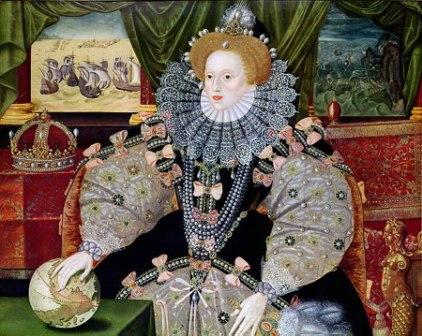Provender-fodder for livestock, originating in 13th century Middle English.
After a series of disappointing mismanagement's within his appointed office, and an unchecked ego, Robert Devereux, the Earl of Essex was due for a sharp reprimand, though his own inflated perception of himself did not allow him to see that the walls of his own design were closing in around him. His monopoly on sweet wines, which Elizabeth I had granted in 1590 for ten years, come up for review in 1600. After several years of giving her last favorite the benefit of the doubt, the queen had grown tired of Essex's behavior. The charismatic bravado that had once entertained her and made her feel carefree in her rare moments away from state business, had now grown to an intolerable, and dangerous level.
 |
| A miniature portrait of the Earl of Essex, by Nicholas Hilliard. Picture acquired through Wikimedia Commons. Image public domain. |
Elizabeth decided to put Essex in his place, saying the above quote before she revoked his monopoly on sweet wines. The "unruly horse", of course, is Essex, and the "provender" is his monopoly. This was a prudent decision of the queen's, not only to send a strong message to Essex about his pride, but also due to the fact that he had now amassed a financial debt somewhere around 16,000 pounds. I agree with David Loades, who in his book Elizabeth I: A Life supposes that Elizabeth did in fact know of Essex's money troubles when she revoked his monopoly, although we cannot ever know for sure (Loades, 277).
The month's ahead were to bring about the end of the Earl and some of his cronies, for their ill-planned and executed rebellion against the queen. While Essex would claim that his intent was not malicious, and that he only wanted to "free" the queen from her ill-advisers, like Robert Cecil, whom he hated, his claim was transparent to those about him: Essex's Rebellion was a personal vendetta for a man with wounded pride, and not about alleged corrupt advisement of the queen.
And anyone who knew Elizabeth, especially those intimates on her Privy Council, knew that know one could ever manipulate or influence the queen to do anything against her will! Elizabeth's judgement was always final, and the ax fell on Essex's head for his twice-fold treason: a personal and political betrayal.
Loades, David. Elizabeth I: A Life. London: Continuum, 2006.
And anyone who knew Elizabeth, especially those intimates on her Privy Council, knew that know one could ever manipulate or influence the queen to do anything against her will! Elizabeth's judgement was always final, and the ax fell on Essex's head for his twice-fold treason: a personal and political betrayal.
Sources:

